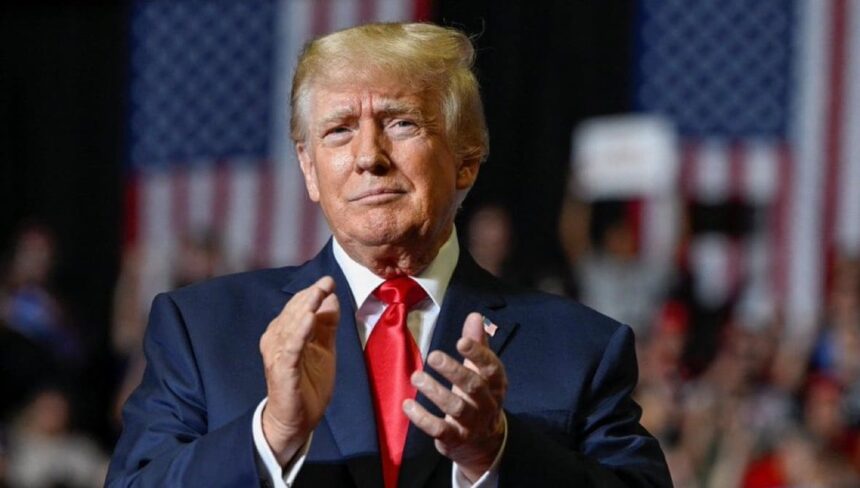U.S. President Donald Trump has set a historically low refugee admission cap for the fiscal year 2026, limiting entry to just 7,500 people. This figure marks the lowest refugee admissions cap in U.S. history, with a significant portion of slots earmarked for white South Africans.
A presidential document issued on September 30, but released on Thursday, indicated that the refugee system would largely remain closed to millions displaced around the globe. The administration’s focus on white Afrikaners from South Africa was highlighted under Executive Order 14204, which also includes provisions for “other victims of illegal or unjust discrimination.”
Trump has previously asserted that white South Africans experience persecution in the primarily Black nation, a claim that the South African government and leaders within the Afrikaner community have disputed.
The document further stipulates that certain foreign nationals will be barred from entry if their admission is deemed contrary to the “national interest.” It also proposes administrative changes that would transfer the management of refugee resettlement grants and contracts from various organizations to the Office of Refugee Resettlement under the Department of Health and Human Services,, aiming to enhance oversight and coordination.
This cap represents a dramatic drop from the 125,000 refugees admitted in the final year of President Joe Biden’s administration and is the lowest since the Refugee Act was enacted in 1980, which established the contemporary refugee admissions framework. Since its inception, over two million refugees have been admitted under this program. The revised cap will take effect from October 2025 through September 2026, raising concerns that the Trump administration might be moving towards an effective halting of refugee admissions entirely. Currently, according to the UN High Commissioner for Refugees (UNHCR), there are approximately 42.7 million refugees worldwide.
Refugees International condemned the new admission cap, labeling it “a mockery of the U.S. refugee program and American values.” The organization remarked, “Let us be frank: whatever hardships some Afrikaners may face, this population has no plausible claim on refugee status; they are not fleeing systematic persecution.”
Refugees International further argued that the administration’s policy could jeopardize the futures of tens of thousands of already vetted refugees, including women from Afghanistan, survivors of sexual violence from the Congo, Sudanese genocide survivors, political dissidents, and targeted religious minorities.
The organization criticized the Presidential Determination as a politically motivated message about who qualifies for protection in the United States, suggesting that it favors white applicants while undermining the purpose of the Refugee Admissions Program. They emphasized that the 1980 Refugee Act was intended to resettle individuals based on humanitarian need rather than race or nationality.
Global Refuge, a prominent organization in refugee resettlement, expressed “grave concern” regarding the new admission framework, describing it as a significant departure from decades of bipartisan policy centered on humanitarian principles. President & CEO Krish O’Mara Vignarajah stated, “This decision doesn’t just lower the refugee admissions ceiling. It lowers our moral standing.”
Vignarajah highlighted that for more than forty years, the U.S. refugee program has been a critical lifeline for families escaping war and persecution. At a time of global crises affecting countries like Afghanistan, Venezuela, and Sudan, tailoring admissions predominantly to one group could undermine the program’s purpose and credibility. She added, “Refugee families are ready to rebuild their lives and give back to the communities that welcome them. But without a fair chance at protection and consistent initial assistance, we risk creating a system that fails both those seeking refuge and the nation that promised it.”
Global Refuge maintained that the fiscal year 2026 cap marks a drift from the United States’ historical role as a humanitarian leader, violating the spirit of the 1980 Refugee Act and the moral obligation to protect those fleeing persecution.
Senator Chris Van Hollen criticized the move, stating, “This doesn’t just gut refugee admissions; it creates a race-based system that prioritizes white South Africans over people facing real danger in their home countries. An insult to everything we stand for.”
Tags: Trump slashes refugee cap to lowest in US history, reserves most slots for white South Africans Extract 5 SEO-friendly keywords as tags. Output only keywords, comma separated.
Hashtags: #Trump #slashes #refugee #cap #lowest #history #reserves #slots #white #South #Africans










